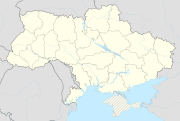Potelytsch
| Potelytsch | ||
| Потелич | ||

|
|
|
| Basic data | ||
|---|---|---|
| Oblast : | Lviv Oblast | |
| Rajon : | Zhovkva district | |
| Height : | 258 m | |
| Area : | 30.7 km² | |
| Residents : | 2,500 (2001) | |
| Population density : | 81 inhabitants per km² | |
| Postcodes : | 80320 | |
| Area code : | +380 3252 | |
| Geographic location : | 50 ° 13 ' N , 23 ° 33' E | |
| KOATUU : | 4622787601 | |
| Administrative structure : | 12 villages | |
| Address: | 80330 с. Потелич | |
| Statistical information | ||
|
|
||
Potelytsch ( Ukrainian Потелич ; Russian Потелич Potelitsch , Polish Potylicz ) is a village in the western Ukrainian Lviv Oblast with about 2500 inhabitants.
It belongs to the district council of the same name along with 12 other villages .
history
Jan Długosz (* 1415; † 1480) mentioned in his chronicle a Tylicz castle wall in the Principality of Bels in 1223. The place was also mentioned earlier in a document from 1261. Around 1420 Siemowit IV received the town charter . Siemowit also founded a Roman Catholic parish in 1423.
In 1462 the Principality of Belz was withdrawn as a settled fiefdom by the Polish crown. The Polish Bełz Voivodeship was established on the territory of the former principality .
When Poland was first partitioned in 1772, the village became part of the new Kingdom of Galicia and Lodomeria of the Habsburg Empire (from 1804).
In 1900 Potylicz had 608 houses with 3261 inhabitants, of which 2445 were Ruthenian-speaking, 805 Polish-speaking, 11 German-speaking, 2340 Greek-Catholic, 586 Roman-Catholic, 335 Jews.
After the end of the Polish-Ukrainian War in 1919, the place became part of Poland. In 1921 miasteczko [town / market town] Potylicz had 633 houses with 3371 inhabitants, of which 2096 Ruthenians, 1275 Poles, 96 Jews (nationality), 2323 Greek Catholics, 778 Roman Catholics, 1 other Christian, 269 Jews (religion). The place lost its market town status in the interwar period.
During the Second World War , the place belonged first to the Soviet Union , from 1941 to the General Government and from 1945 back to the Soviet Union, now part of the independent Ukraine .
One of the largest German war cemeteries in Ukraine is located in Potelytsch, with 15,400 burials to date.
Attractions
- Greek Catholic wooden church , built in 1502, rebuilt in 1736, included in the UNESCO World Heritage list from 2013 , see the wooden churches of the Carpathian region in Poland and Ukraine
- Brick Greek Catholic Church, built in 1936
- Roman Catholic Church, built 1824–1837, closed in 1947, reopened in 1990
- Ruins of the ramparts on the hill of Stare Horodyschtsche
Personalities
- Kasjan Sakowicz (1578–1647) religious activist, theologian, writer
Web links
- Potylicz . In: Filip Sulimierski, Władysław Walewski (eds.): Słownik geograficzny Królestwa Polskiego i innych krajów słowiańskich . tape 8 : Perepiatycha – Pożajście . Walewskiego, Warsaw 1887, p. 879 (Polish, edu.pl ).
Individual evidence
- ↑ a b c d Grzegorz Rąkowski: Ukraińskie Karpaty i Podkarpacie, część zachodnia. Przewodnik krajoznawczo-historyczny . Oficyna Wydawnicza "Rewasz", Pruszków 2013, ISBN 978-83-62460-31-1 , p. 148-150 (Polish).
- ↑ Ludwig Patryn (Ed.): Community encyclopedia of the kingdoms and countries represented in the Reichsrat, edited on the basis of the results of the census of December 31, 1900, XII. Galicia . Vienna 1907.
- ↑ Główny Urząd Statystyczny: Skorowidz miejscowości Rzeczypospolitej Polskiej. Tom XIII. Województwo lwowskie . Warszawa 1924 (Polish, online [PDF]).
- ↑ Potelitsch war cemetery - construction, maintenance and repair | Volksbund.de. Retrieved June 9, 2019 .





